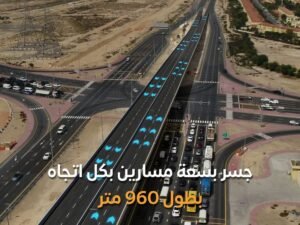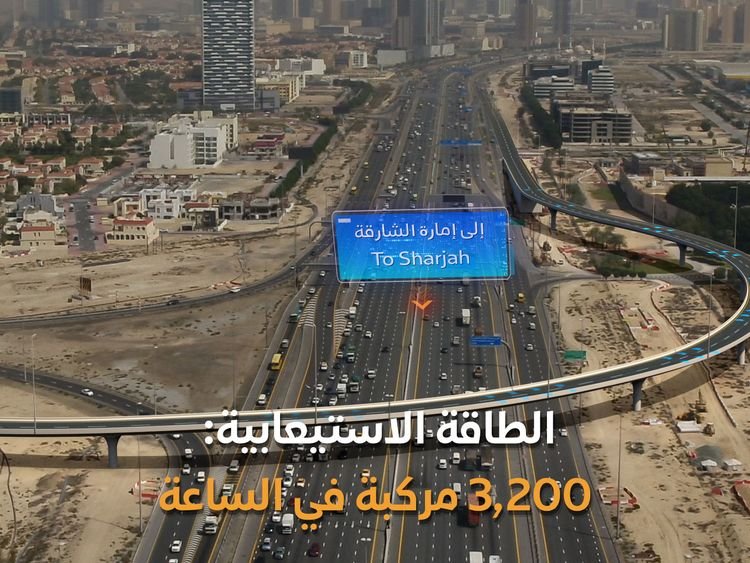The Roads and Transport Authority (RTA) in Dubai has recently granted a contract for the improvement project of the Garn Al Sabkha Street Sheikh Mohammed Bin Zayed Road Intersection. The project involves the construction of four bridges spanning a total of 3,000 meters and designed to accommodate 17,600 vehicles per hour.
With a budget of Dh374 million, this initiative was initiated based on the directives of His Highness Sheikh Mohammed bin Rashid Al Maktoum, the Vice-President and Prime Minister of the UAE and Ruler of Dubai, as well as Sheikh Hamdan bin Mohammed bin Rashid Al Maktoum, the Crown Prince of Dubai and Chairman of the Executive Council. The aim is to keep pace with Dubai’s evolving landscape and address the requirements of urban development and population growth.
Mattar Al Tayer, the Director General and Chairman of the Board of Executive Directors at RTA, explained the significance of this project, stating, “This undertaking is part of a broader initiative to enhance the Garn Al Sabkha Street Corridor, which connects Sheikh Zayed and Sheikh Mohammed bin Zayed Roads. Its objective is to ensure smooth traffic flow between Sheikh Zayed Road, Sheikh Mohammed bin Zayed Road, First Al Khail Street, and Al Asayel Street.”

Once the project is completed, it is expected to reduce travel distance and time by 40 percent for vehicles traveling from Garn Al Sabkha Street to Sheikh Mohammed bin Zayed Road in the direction of Al Qusais and Sharjah, resulting in a decrease in peak hour travel time from 20 minutes to just 12 minutes.
Additionally, it will reduce travel time by 70 percent for vehicles traveling from Sheikh Mohammed bin Zayed Road towards Al Yalayis Road in the direction of Jebel Ali Port, reducing the journey time from 21 minutes to seven minutes, as stated by Al Tayer.
According to Al Tayer, the project entails the construction of four bridges. The first bridge, measuring 960 meters, is situated at the intersection of Garn Al Sabkha Street and Al Asayel Street. This two-lane bridge has a capacity to accommodate 8,000 vehicles per hour in both directions, ensuring smooth traffic flow between Sheikh Zayed Road and Sheikh Mohammed bin Zayed Road.
The second bridge spans 660 meters and consists of two lanes. It is intended to serve the traffic from Garn Al Sabkha Street, facilitating travel in a westward direction towards Sheikh Mohammed bin Zayed Road in the northward direction, specifically heading to Al Qusais and Sharjah. This bridge is capable of handling 3,200 vehicles per hour.
Al Tayer further elaborated on the project, mentioning two additional bridges. The third bridge, spanning 700 meters and consisting of two lanes, aims to streamline traffic flow and eliminate overlapping traffic from Sheikh Mohammed bin Zayed Road heading northward to Al Yalayis Road in the direction of Jebel Ali Port. This bridge has a capacity of accommodating 3,200 vehicles per hour.
The fourth bridge, measuring 680 meters in length and comprising two lanes, is designed to ensure smooth traffic flow and prevent overlapping traffic from Sheikh Mohammed bin Zayed Road to the service road leading to Dubai Production City. It can handle a capacity of 3,200 vehicles per hour.
In addition to the bridge construction, the project also includes the development of 7 kilometers of roadwork. This involves enhancing surface intersections on the service road that runs parallel to Sheikh Mohammed bin Zayed Road. The project also encompasses the installation of street lighting, traffic signals, traffic systems, rainwater drainage networks, and irrigation system networks.
The Garn Al Sabkha – Sheikh Mohammed Bin Zayed Roads Intersection Improvement Project is a vital component of the RTA’s master plan to upgrade key road corridors in both the eastern and western regions, such as Al Yalayis and Expo Roads, which were completed by the RTA a few years ago.
These strategic road networks strengthen Dubai’s transportation system, serve various developmental projects along the roads, and cater to both current and future traffic demands.
- Taking lead from Gulf News


